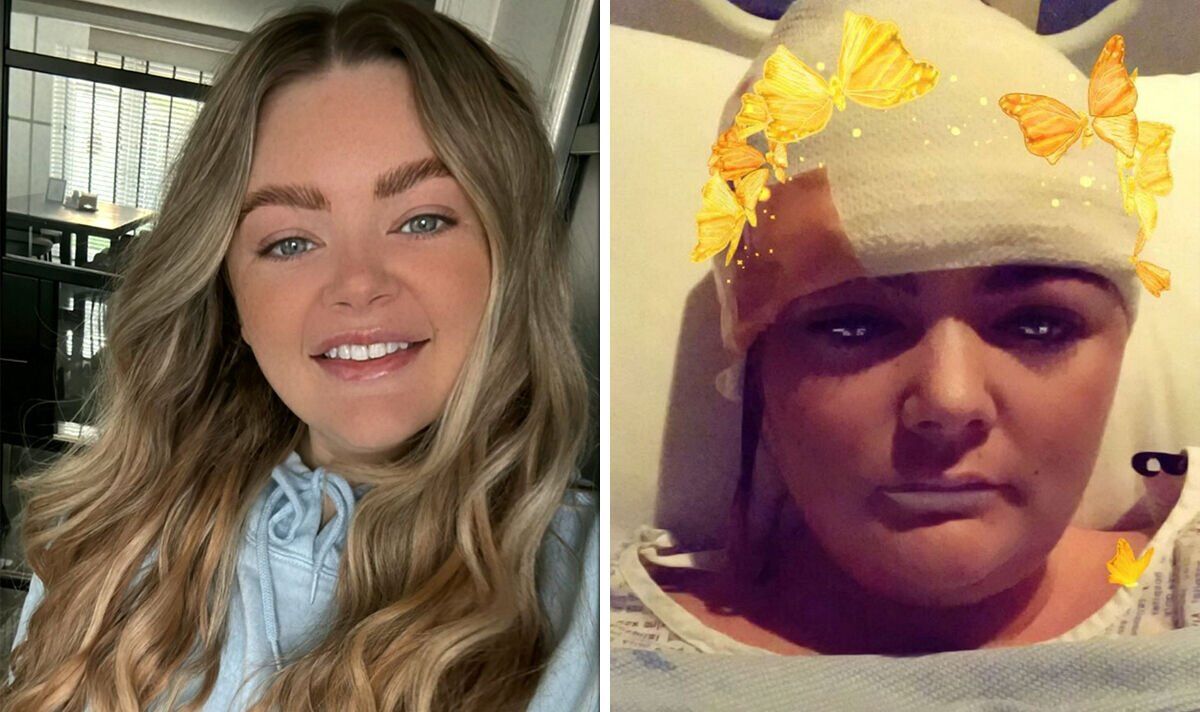
Brain tumour: Cancer Research UK on 'different types' in 2017
A woman who dismissed “constant headaches” was diagnosed with a rare incurable brain tumour. Jade McMaster, 32, suffered from the headaches for five years before she collapsed and had a seizure in 2017. She was rushed to Queen Elizabeth University Hospital, in Glasgow by ambulance where she underwent rigorous testing.
Jade, who works as a personal assistant at the Royal Bank of Scotland, Glasgow, recalled her symptoms. She said: “The headaches would just totally come out of the blue and I didn’t think anything of it.
“You just take a couple of paracetamols and think you’ll be alright.
“I was out cold and didn’t remember anything. I woke up battered, bruised and confused in hospital surrounded by my loved ones.”
After two days of scans, doctors told her she had a brain abnormality and was diagnosed with secondary epilepsy – a form of epilepsy caused by an underlying brain condition.

Further testing revealed she had a grade two oligodendroglioma brain tumour on her left temporal lobe, the part of the brain that affects speech and memory, which meant only part of the tumour could be removed.
“I really didn’t expect to be told I had a mass on my brain,” she said. “It was confusing.”
While the doctors were unsure on the prognosis of the tumour, they knew they had to act fast.
Jade said: “I was living a happy, healthy-ish lifestyle for anyone my age. I also have no family members with brain tumours, so it was a complete shock to everyone.”
Don’t miss…
Six ‘early’ signs of a stroke that could appear a week before[EXPERT]
Cancer symptoms: ‘Sudden dislike’ of one drink could signal cancer[INSIGHT]
Simple memory test could predict dementia 10 years early[STUDY]
In December 2017, Jade was admitted for a 10- hour surgery to remove 85 percent of the mass.
She said: “I was awake during the surgery, so they could track where my speech became impaired if they were to remove too much.
“I’m grateful to have my speech, but I’m sure people would be happier if I didn’t speak so much.”
Following her diagnosis, Jade consistently attended regular scans, to ensure the tumour had not grown.

After “making the most of her life” following her diagnosis, Jade thought she had been through the worst.
However, as 15 percent of the tumour was unable to be removed, she knew it was not the end. Following routine scans she was told her tumour had grown back back in June 2021.
“It’s like a never-ending cycle, I knew it would happen, despite it being so slow growing, but it is still frustrating,” she said.
After 33 sessions of radiotherapy and 12 sessions of chemotherapy, she finished her last course of treatment in November 2022. New scans from February this year, showed the tumour was at a manageable level.

Jane currently attends regular check-ups and scans to ensure the tumour does not progress again.
And she is now urging anyone with even the slightest symptoms such as out-of-the-blue headaches to reach out for professional help.
“If you’re having headaches too often, go to your doctor and ask for a scan,” she said. “Be persistent, and fight for your life.”
According to the NHS, common signs of a brain tumour include:
- Headaches
- Seizures (fits)
- Persistently feeling sick (nausea), being sick (vomiting) and drowsiness
- Mental or behavioural changes, such as memory problems or changes in personality
- Progressive weakness or paralysis on one side of the body
- Vision or speech problems.
If you are concerned that you could have a brain tumour you should see your GP.
Source: Read Full Article